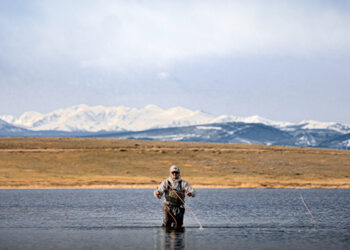In the November/December 2020 issue, Frank Olive, the Outdoor Adventures assistant coordinator for education at the University of Alaska Fairbanks, shares advice on successful outdoor offerings.
What are your most successful programs and why?
FO: Our two most successful outdoor offerings are the Outdoor Adventures for credit classes, such as Introduction to Mountaineering and Introduction to Wilderness Leadership, and our wilderness orientation program. These programs have enough time built in for more in-depth learning and self-discovery. Students generally get pushed out of their comfort zone, are forced to work hard and maybe even have a bit of Type Two fun — fun that is miserable while it’s happening but is fun in restrospect. This helps create more resilience and grit in the students. These programs also create lasting bonds between everyone in the programs which helps foster engagement with the university community and our outdoor program.
What are the top lessons you’ve learned over the years in conducting successful outdoor offerings?
FO: I have realized I always have things to learn, and this learning comes in many forms. It could be searching out structured professional development like an AMGA or ACA course. It might be a student showing me how to do something in a new way or asking a question that makes me find a different way to explain something. Sometimes it is also through the magic question, “Why do you do it that way?” which can lead to self-discovery and a reexamination of a long assumed way of doing something. However, as it comes about, it is important for me to be open-minded to this learning and find ways to bring these new ideas and methods to my students in the future.
How can outdoor programs build student leaders?
FO: After giving students the tools to be leaders, I think it is important to find ways to let them lead others. Student-led trips are a great way to provide students with practice as leaders, as well as a way to discover their personal style of leadership. It is important to provide feedback of both the things that went well and the things that need improvement to help the student leaders continue to grow. I have also found having more experienced student leaders mentoring newer student leaders can help both of the students become better leaders as they move forward.
What are creative ways you’ve found to educate students through successful outdoor offerings?
FO: I have found training trips for my student leaders are a great way to educate all of us. Setting this time aside to provide instruction, feedback and two-way discussion has been a great tool in their leadership development. Structuring this time with learning objectives and providing a model for the way in which trips should run has provided my students with a framework to build upon when leading their own trips. In addition, being in the field with them provides us a platform to have campfire discussions about important topics such as inclusion, race, gender identity and political division, which helps everyone see different points of view and hopefully encourages more empathy in everyone involved.
How do you best see outdoor programs serving students even if done so virtually?
FO: I feel today’s student is really tuned into video content, and I’m embracing this as the most effective way to serve students virtually. They are on YouTube or TikTok in their personal lives so much that online articles, online PowerPoints, lecture notes and the like don’t seem to capture the attention of the students and convey content with the same effect as a video lecture, using Kaltura Personal Capture with a slide presentation, or a video demonstration of skills. Some of both the soft and hard skills necessary for outdoor recreation can be made accessible through these video presentations to serve the students of our outdoor program. Another way I have worked to serve students is through things like multimedia trip plans. These provide students with the information necessary to be able to have their own adventures in a time when our program is not able to help them get out to these places.










